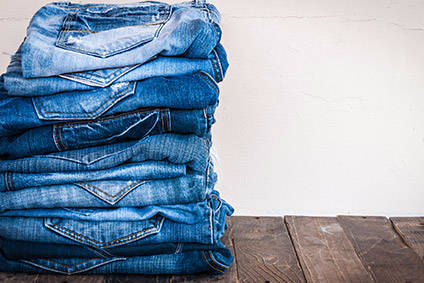
US speciality apparel retailer Gap Inc’s Banana Republic brand is to adopt a new environmentally-friendly indigo yarn dyeing process that uses foam instead of water – eliminating 99% of the water typically used in indigo-dyeing.
Developed by Tejidos Royo, a Spanish fabric mill with a reputation for prioritising environmental performance, the new process – Dry Indigo – uses 89% less chemicals, reduces energy usage by 65%, and eliminates water discharge when compared to the traditional slasher indigo (or sheet dyeing) process.
“Leveraging this revolutionary new dyeing process directly supports Gap Inc’s manufacturing goal to conserve 10bn litres of water by the end of 2020, as well as Banana Republic’s recently unveiled sustainability goals to produce eco-friendly denim, reduce water impact and promote cleaner chemistry,” said Gap Inc’s EVP of global sourcing, Christophe Roussel. “Tejidos Royo is a trusted partner and true pioneer in sustainable innovation. We are thrilled to work with them on this exciting new venture and have no doubt that this will change the future of denim manufacturing.”
Utilising a foam dye that adheres to yarn, the Dry Indigo technique produces a denim fabric that is comparable in hand-feel, aesthetic, performance, and washability to traditionally dyed denim.
The Banana Republic denim with Dry Indigo will be available through a special collection for both men and women in spring 2020. Both lines will include selectively sourced and sustainable pocketing and trims, such as 100% Global Recycle Standard (GRS) certified recycled poly zipper tape. The manufacturing will be done at Saitex – a state-of-the-art sustainable factory that recycles 98% of the water it uses.
Currently, the Dry Indigo process is exclusive to Tejidos Royo, and Banana Republic is one of the first brands to pilot the technology, along with jeans giant Wrangler.
How well do you really know your competitors?
Access the most comprehensive Company Profiles on the market, powered by GlobalData. Save hours of research. Gain competitive edge.

Thank you!
Your download email will arrive shortly
Not ready to buy yet? Download a free sample
We are confident about the unique quality of our Company Profiles. However, we want you to make the most beneficial decision for your business, so we offer a free sample that you can download by submitting the below form
By GlobalDataCreating the ground-breaking process required ten years of collaborative research with Gaston Foam Systems and Indigo Mills Designs before its launch. The foam-dyeing technique occurs in a space of less than 65ft – compared to the hundreds of feet that is typically necessary for a traditional dyeing machine – thereby significantly reducing energy needs.
The apparel industry is one of the largest and most intensive users of water. In response, Gap has worked closely with supply chain partners to implement numerous water-saving initiatives. In 2016, the retailer introduced Washwell, a smart denim wash programme that has enabled the company to save more than 229m litres of water when compared to conventional wash methods. The company recently announced it has saved 5.7bn litres of water through combined efforts so far. Banana Republic will adopt the Washwell programme in 2020.
Last week, Gap announced it is teaming up with Arvind Limited, its longtime sourcing and franchise partner in India, to open a new innovation centre highlighting solutions to reduce water use in the textile manufacturing industry.



